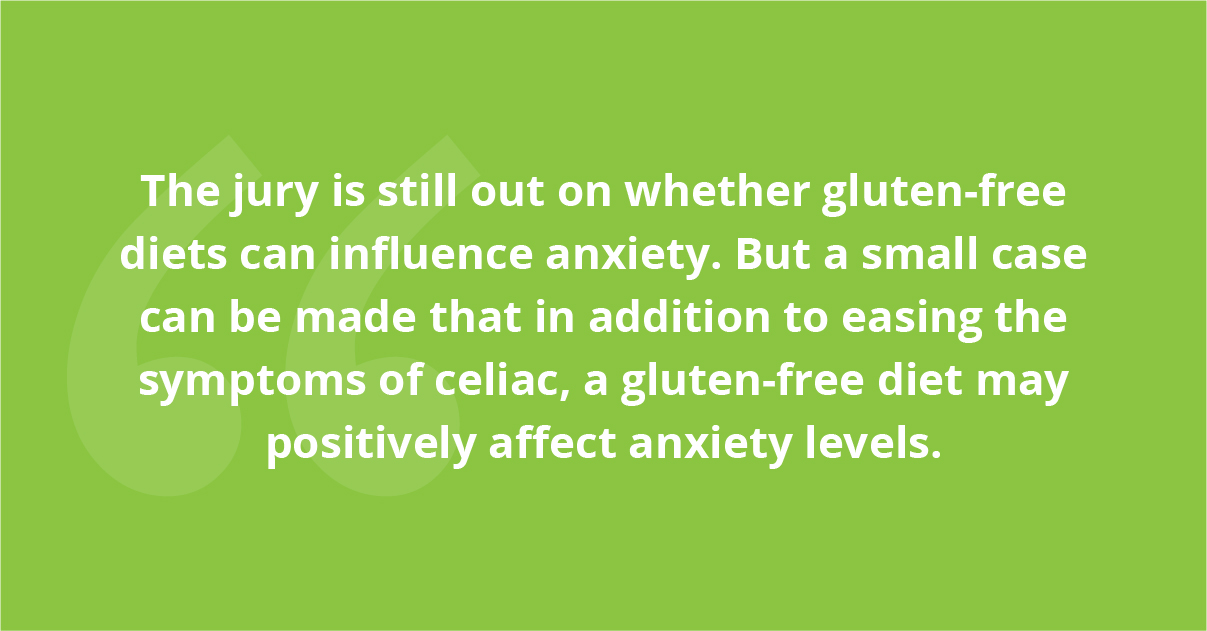We all experience anxiety at one time or another. Sometimes it’s situational anxiety, and other times it’s temporary. Whether it’s caused by family, financial, personal or relationship challenges, anxiety is a common occurrence.
But when it goes on for too long or happens too often, ongoing anxiety can have consequences that reach far beyond mental health. At its peak, chronic anxiety can affect your sleep, immune system and even digestive health.

Scientists have long known that the stomach is extremely sensitive to emotion. Although the connection between the brain and the digestive system is a little murky, what’s clear is that the gut and the brain regularly ‘speak.’ Described as the gut-brain connection, both systems have the ability to influence and manipulate the actions of one another.
For celiac sufferers that means emotions like anxiety and stress can worsen gut symptoms of abdominal pain or cramping. In fact, those with celiac are advised to avoid anything that causes anxiety or stress for this very reason.
But if the brain can influence the gut, is the reverse also true? For those with celiac, would controlling the symptoms of the disease reduce feelings of anxiety?
Celiac Disease and Gluten
To test this theory, researchers at the Institute of Internal Medicine in Italy followed a group of 35 participants with celiac disease. Participants started a gluten-free diet and answered questions about their anxiety levels. One year later the researchers followed up, and, interestingly, they found that adoption of a gluten-free diet played a role in reducing anxiety levels.
As those with celiac disease know, avoiding gluten is essential to good health. When gluten-containing foods such as bread or pasta are eaten, an inflammatory response in the small intestines is triggered. Over time, this reaction damages the lining of the digestive tract and prevents it from absorbing nutrients. However, patient education about celiac disease tends to focus primarily on the physical impacts, and not psychological issues.
Another 2008 study found a similar link between gluten and anxiety. Researchers noted that anxiety was higher in celiac patients before they started a gluten-free diet than after adhering to it. However, not all studies show clear evidence of a relationship between the two. A 2020 paper found that a gluten-free diet had no effect on reducing anxiety levels in those with celiac disease.

There certainly appears to be a relationship between gluten and our mental wellbeing but scientists are not sure how strong that relationship is. These conflicting studies show that more research around the topic is needed. Still, when it comes to anxiety and gluten-free diets, it appears that going gluten-free is certainly a thought to keep in mind.
Going Gluten-Free
Making the transition to a gluten-free diet is not always easy. The associated costs, food availability and restricted menu options require commitment. But the benefits of going gluten-free might be worth the effort. One 2015 study found that for those with celiac, going gluten-free actually increased their health-related quality of life.
If you plan on going gluten-free, here are a few tips to help you out:
- Plan your meals and snacks ahead of time—this allows you to keep cravings for non-gluten items at bay.
- Read food labels carefully and look for hidden gluten, such as in medicine and some food additives. If a label says “modified food starch,” the product may contain gluten.
- Bake some treats like muffins, granola bars, and cookies using gluten-free flours. Store them in the freezer for later as quick snacks.
- If you take a medication, whether prescribed, over the counter or a natural health product, check with your pharmacist to see if it contains gluten.
- Having trouble starting or sticking to a gluten-free diet? Consider speaking to a nutritionist or dietitian to help create one.
- When deciding to go gluten-free, pay attention to possible nutritional deficiencies. Common nutrients you may need to supplement can include vitamin B, folate and calcium.
- Finally, join in a celiac/gluten-free support group for a little more inspiration and information from like-minded folks!
Ask a Professional
The jury is still out on whether gluten-free diets can influence anxiety. But a small case can be made that in addition to easing the symptoms of celiac, a gluten-free diet may positively affect anxiety levels.
Going gluten-free for a short time may be worth a shot if it suits your lifestyle and can be safely done. However, as with any big dietary change, speak to your own doctor or healthcare advisor first to make sure that it’s appropriate for you.
Members of GIThrive have access to nutrition and meal planning advice as well as support from our team of registered dietitians and health coaches. So, if you need some guidance on creating a gluten-free shopping list or suggestions on foods to avoid, we can help.
Have challenges bringing up gut health and your symptoms in conversations with friends, colleagues or even your doctor? You might be interested in our upcoming Taking Stigma Out of Digestive Disease webinar. Register through the button below.
This article was provided by the GIThrive® Care Team.







